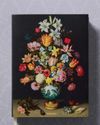
In 1894, when Nicholas II became Tsar of Russia, he was the wealthiest man on the planet. Worth 240 billion pounds in today's money, he was richer than any modern-day billionaire. Unsurprisingly, the Russian royal family spent lavishly, and were served by several official court jewellers. But names like Hahn, Ovchinnikov and Bolin have been largely forgotten. Only one court jeweller - the House of Fabergé - has achieved longevity, becoming a byword for absolute luxury.
Founded in St Petersburg in 1842 by Gustav Fabergé, the firm rose to prominence under the directorship of his son, Peter Carl Fabergé. Kieran McCarthy, director of Wartski, the London-based firm which specialises in the work of Fabergé, explains why he came to eclipse his competitors: 'Carl Fabergé's genius was that he understood the desires and interests of his patrons. These were very wealthy, very spoiled people who could have the absolute best of anything they wanted. They already had fabulous jewellery. It didn't really excite them. But the skill, quality and ingenuity of Fabergé's designs sent shivers down the spine. Each was unique, like a work of art. His patrons recognised Fabergé as the greatest craftsman of his generation.'
The renowned Imperial eggs have also fuelled Fabergé's legendary status. At Easter an important occasion in the Orthodox religious calendar - even the poorest peasants exchanged painted or wooden eggs. In 1885, Tsar Alexander III commissioned Fabergé to create a special Easter present for his wife. This first egg followed a design specified by the Tsar - the plain white enamel exterior twisted open to uncover a series of surprises: first a yolk, made of gold, which contained a golden hen with ruby eyes. Hidden inside the hen was a diamond miniature of the Imperial crown, which itself opened to reveal the final surprise: an egg-shaped ruby pendant.
Diese Geschichte stammt aus der April 2023-Ausgabe von Homes & Antiques.
Starten Sie Ihre 7-tägige kostenlose Testversion von Magzter GOLD, um auf Tausende kuratierte Premium-Storys sowie über 8.000 Zeitschriften und Zeitungen zuzugreifen.
Bereits Abonnent ? Anmelden
Diese Geschichte stammt aus der April 2023-Ausgabe von Homes & Antiques.
Starten Sie Ihre 7-tägige kostenlose Testversion von Magzter GOLD, um auf Tausende kuratierte Premium-Storys sowie über 8.000 Zeitschriften und Zeitungen zuzugreifen.
Bereits Abonnent? Anmelden

THE ANTIQUES THAT SHAPED ME - Tess Newall
The decorative artist and homeware designer shares her love of patina and a treasured childhood flower press

A Victorian Vision
There's a magical, story-book feel to this 19th-century manor in the Lincolnshire Wolds, where much-loved antique and vintage collections and a sensitive restoration have brought it back to life

Farm FRESH
Filled with painstakingly sourced primitive antiques and Welsh decorative pieces, Dorian Bowen's atmospheric farmstead is an authentic homage to bygone times

THE WOMEN OF MODERNISM
In the Modernist era, when clean lines, geometric forms, and functional design reshaped the world, a group of often-overlooked visionary women defied convention, pioneering innovations that laid the foundations of modern design, says

Global Treasures
Amber Clery has created a cosy, bohemian home filled with unusual finds gathered from her travels across the world

A blazing SUCCESS
This Georgian home in Northern Ireland, once ravaged by fire and time, has been reimagined for the modern age with vibrant colour, joyful patterns and a perfect balance of old and new

HEIRLOOMS OF THE FUTURE SHANNON CLEGG
The botanical sculptor talks to Dominique Corlett about finding her niche and how her creative practice connects with the landscape of her childhood

48 hours in FROME
A cloth town of great importance from the 15th to the late-18th century, Frome in Somerset is now on the map for its vintage fashion and sustainable clothing, as well as its buzzing antiques scene, discovers Rosanna Morris

Island HOPPING
The traditional fitted kitchen island now faces competition from more flexible, modern alternatives

ON THE COFFEE TABLE Art through the ages
Explore 700 years of art history through the paintings of The National Gallery, with people at the heart of every page